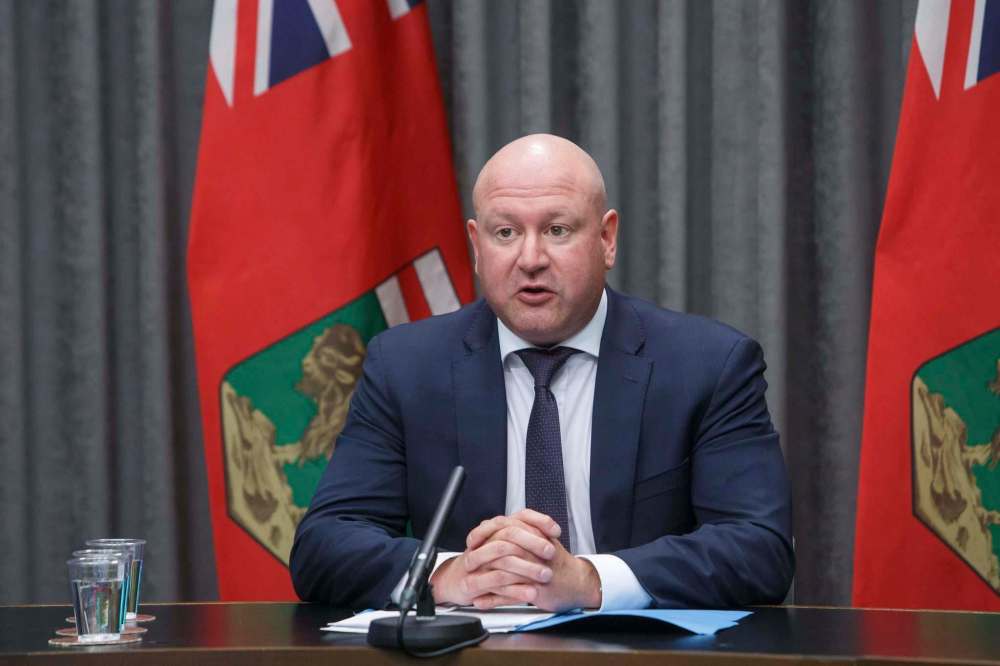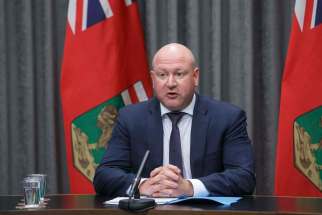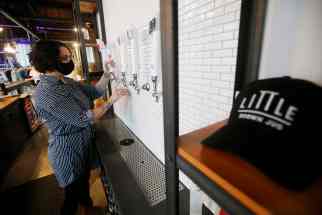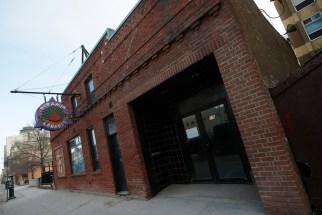Pints, politics and public health: Behind the reversal of COVID beverage-room order
Read this article for free:
or
Already have an account? Log in here »
To continue reading, please subscribe:
Monthly Digital Subscription
$0 for the first 4 weeks*
- Enjoy unlimited reading on winnipegfreepress.com
- Read the E-Edition, our digital replica newspaper
- Access News Break, our award-winning app
- Play interactive puzzles
*No charge for 4 weeks then price increases to the regular rate of $19.00 plus GST every four weeks. Offer available to new and qualified returning subscribers only. Cancel any time.
Monthly Digital Subscription
$4.75/week*
- Enjoy unlimited reading on winnipegfreepress.com
- Read the E-Edition, our digital replica newspaper
- Access News Break, our award-winning app
- Play interactive puzzles
*Billed as $19 plus GST every four weeks. Cancel any time.
To continue reading, please subscribe:
Add Free Press access to your Brandon Sun subscription for only an additional
$1 for the first 4 weeks*
*Your next subscription payment will increase by $1.00 and you will be charged $16.99 plus GST for four weeks. After four weeks, your payment will increase to $23.99 plus GST every four weeks.
Read unlimited articles for free today:
or
Already have an account? Log in here »
Hey there, time traveller!
This article was published 20/10/2020 (1881 days ago), so information in it may no longer be current.
The province’s last-minute decision Monday to reverse an order that would have closed Winnipeg-area beverage rooms to curb the spread of COVID-19 is being met with raised glasses — and raised eyebrows.
While business owners are applauding the move, critics are questioning whether economic and political interests influenced public health orders.
Timeline
Oct. 7
New public health orders for the metropolitan Winnipeg region take effect, prohibiting licensed premises from selling or serving liquor between 10 p.m. and 9 a.m.
Thursday, 12:30 p.m.
Dr. Brent Roussin tells reporters at a COVID-19 briefing that tougher pandemic response measures are needed to bring down the rate of COVID-19 transmission in Winnipeg, saying “we’ve lost our way” and “we’re going to need to act.”
Oct. 7
New public health orders for the metropolitan Winnipeg region take effect, prohibiting licensed premises from selling or serving liquor between 10 p.m. and 9 a.m.
Thursday, 12:30 p.m.
Dr. Brent Roussin tells reporters at a COVID-19 briefing that tougher pandemic response measures are needed to bring down the rate of COVID-19 transmission in Winnipeg, saying “we’ve lost our way” and “we’re going to need to act.”
Friday, 2 p.m.
Roussin and Health Minister Cameron Friesen announce stricter COVID-19 measures to take effect Monday. A press release said the measures include closing all beverage rooms, entertainment facilities, casinos and bingo halls.
Friday-Monday
The Manitoba Hotel Association, Manitoba Chambers of Commerce and hotel and beverage room operators campaign through media interviews and government relations to reverse the decision to close beverage rooms.
Monday, 12:30 p.m.
At a Monday COVID-19 briefing, Roussin says that writing public health orders is a challenge, and there are grey areas where some businesses might be hit unintentionally, and that work is underway to try to reflect business concerns.
Monday night
Just before 5 p.m., new public health orders are posted online that allow beverage rooms to remain open: “These orders come into effect at 11 p.m. tonight and remain in effect until 11 p.m. on Nov. 2. These orders replace the orders issued on Oct. 7.”
After 8 p.m. Monday
The province issues a press release: “Following further review, facilities licensed as beverage rooms under the Liquor, Gaming and Cannabis Control Act have not been closed under the order. All other requirements for licensed premises will still apply.”
— Carol Sanders, with files from Danielle DaSilva
At a press conference Friday afternoon, Dr. Brent Roussin and Health Minister Cameron Friesen announced that beverage rooms in the metro Winnipeg region would have to close for at least two weeks starting Monday to help stop the spread of runaway COVID-19 cases.
By suppertime Monday, after three days of media reports about already-struggling beverage rooms fearing they may not survive another shutdown, new orders were issued allowing them to remain open.
The Manitoba Hotel Association and others were able “to make a case, and the government changed its mind on the public health orders,” said Scott Jocelyn, president and CEO of the association. “We’re appreciative of the fact.”
The government had to balance public safety while being mindful of the measures taken and their economic impact, Jocelyn said.
“Another body blow would’ve been tough for our people,” said Jocelyn. “If they put those protocols on us, we need help.”
With pandemic restrictions resulting in fewer hotel guests and cancelled hotel event bookings, the two-week shutdown of hotel beverage rooms was seen as “extremely punitive,” he said. Tying public health orders to different types of liquor licences didn’t make sense or seem fair, either, with beverage rooms forced to close and restaurant lounges allowed to remain open, for instance.
“Another body blow would’ve been tough for our people. If they put those protocols on us, we need help.” – Scott Jocelyn, Manitoba Hotel Association president and CEO
Media reports and lobbying by the hotel association played a role in changing the orders to exclude beverage rooms from the two-week shutdown, said Chuck Davidson, president of the Manitoba Chambers of Commerce who gave many media interviews over the weekend on the matter.
“I think there’s no question that is what happened,” and it’s “not necessarily terrible,” Davidson said Tuesday. The business community encourages government to consult with them before making changes that impact them “to avoid having to go back on something,” he said.
On Tuesday, the province admitted it had to go back and issue new orders to hit the right public health targets.
“Closing both beverage rooms and entertainment facilities was initially proposed as a targeted measure to address the surge in positive COVID-19 cases in Winnipeg, including high numbers of close contacts, especially among young Manitobans,” a government spokesman said in an email.
“As the formal public health orders were being drafted, it became apparent that the sector has evolved beyond the current liquor licence categories,” he said. “Given that many beverage rooms are operating more like restaurants, it was determined that a closure of beverage rooms is not required at this time.”
“Given that many beverage rooms are operating more like restaurants, it was determined that a closure of beverage rooms is not required at this time.” – Government spokesman
The government spokesman referred to Roussin’s comments at Monday’s press conference about the “grey areas” created by licensing distinctions that pose a challenge when public health orders are written.
Ultimately, it is the chief provincial public health officer who signs and issues the orders and the government follows them, he said.
An outspoken critic of how governments are responding to the pandemic agrees, and said economic interests shouldn’t influence those health orders.
“Watering down a pandemic safety order, strictly for economic reasons, is shameful and dangerous…,” said Amir Attaran, a professor in the law facullty and School of Epidemiology and Public Health at the University of Ottawa.
“The legislative assembly has given (Dr. Roussin) the legal mandate in the Public Health Act to protect health purely; it has not given him any mandate to consider economic impacts…,” Attaran said Tuesday.

Others say the buck stops with elected officials in power.
“Dr. Roussin can give his advice on what he thinks the public health order should be but, at the end of the day, it’s Mr. Pallister’s cabinet that actually puts the order into place,” Manitoba NDP Leader Wab Kinew said Tuesday. “I do think there’s a political dimension to this but I don’t think it’s coming from Roussin. I think it’s coming from elected officials like Mr. Pallister, Mr. Friesen and those folks.
“The fact that there’s no direct financial assistance for these businesses when they’re being ordered to close is the reason that they’re fighting back so hard,” said Kinew. Without paid sick leave or grants to businesses forced to close, some are facing “an existential threat to their continued operation,” he said.
“On the flip side, if we had that financial help and paid sick leave, I’m not saying business owners would be happy to close their doors but maybe they’d be more amenable when a public health order gets put in place,” Kinew said. “The government can’t just use the hammer to make orders — they have to use the carrot to support folks who are going to be impacted by these things.”
Manitoba Liberal Leader Dougald Lamont said the government is forcing workers and businesses to choose between getting sick from COVID-19 or going broke.
“The government is basically trying to make them pay for keeping everyone else safe,” Lamont said.
Rather than provide assistance to beverage rooms, the province walked back the shutdown, he said.
“A business lobby can come in and get public health rules changed even though it may make the spread of COVID worse,” he said. “We shouldn’t be in a position where businesses have to become a public health risk in order to stay afloat. That’s where we are right now.”
carol.sanders@freepress.mb.ca

Our newsroom depends on a growing audience of readers to power our journalism. If you are not a paid reader, please consider becoming a subscriber.
Our newsroom depends on its audience of readers to power our journalism. Thank you for your support.
History
Updated on Tuesday, October 20, 2020 7:46 PM CDT: Headline changed.












